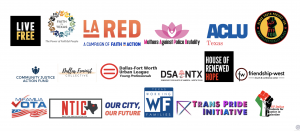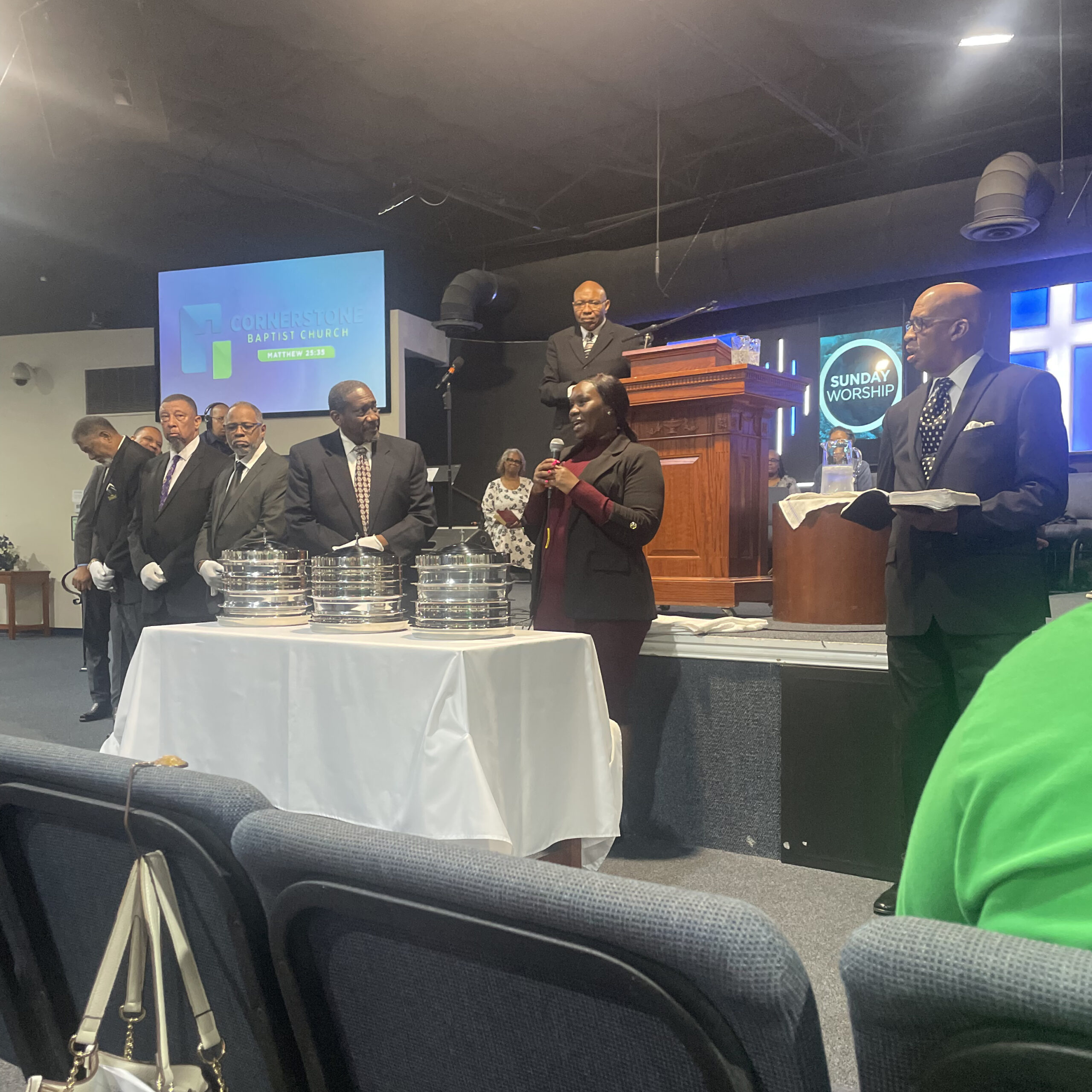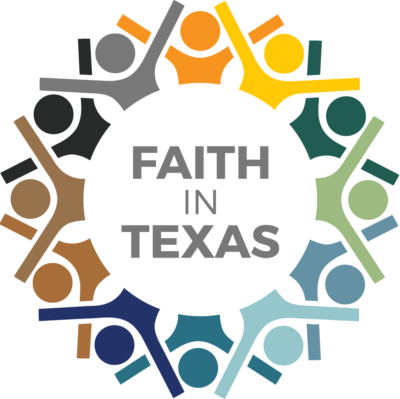For Immediate Release
Faith in Texas and partners are calling on the Dallas County Felony and Misdemeanor Criminal Judges, Sheriff Marian Brown, Dallas County Commissioners, and District Attorney John Creuzot to act now to protect all of us –– our incarcerated loved ones, and those who work in courts, jails, and prisons, as well as our entire community.
Read the full platform below and add your signature to the petition here.
___
To the Leadership of Dallas County and the City of Dallas:
As formerly incarcerated people ourselves, and those who are leading grassroots work with incarcerated and formerly incarcerated populations, we are reaching out to you on behalf of the thousands of people who are currently incarcerated or under community supervision within our county. While you may receive other recommendations on the growing concerns regarding COVID-19, we represent the community that will be directly affected by the successes or failures of health-related planning and implementation in our community’s jails.
Heightened concern over the COVID-19 pandemic has gripped our communities. As of March 23, Texas has seen a steady increase in the number of cases, even though testing is still widely unavailable. Each day, the number of people infected with the virus in Dallas County continues to rise with no evidence of relief coming soon. We have taken the necessary precautions to keep our neighbors and families safe. We have limited public gatherings, our schools have closed indefinitely, restaurants closed to dine-in patrons, businesses are operating remotely, and increasing numbers of people are isolating in order to discourage the spread of infection. However, insufficient preparation has been taken to limit the spread of COVID-19 through one of the largest and most vulnerable institutions in our community: the Dallas County Jail at the Lew Sterrett Justice Center.
The Texas Commission on Jail Standards population report for March 2020 lists Dallas County as having the second greatest jail population in Texas, followed only by Harris County. At this time, Dallas County is housing over 3,000 persons on pre-trial felony charges, about 300 on pre-trial misdemeanor charges, and has a total population of almost 5,700. Furthermore, the TCJS notes that the average rate of the population at Lew Sterrett is around 5,000. The individuals crowded into our jails are medically vulnerable and held in close contact with each other, without frequent and adequate access to water and soap. Governor Abbott issued an executive order on March 19 telling all Texans to avoid social gatherings and groups of more than ten people. Incarcerated populations don’t have the luxury of “social distancing” to protect their health. In a context where healthcare is deficient, housing conditions are squalid and individual needs are neglected, this is a recipe for the rapid spread of disease through correction officer contact and other personnel who could facilitate community spread throughout the jail.
Recently released individuals have started to speak out about the notoriously unsanitary and overcrowded conditions in our jails. The lack of adequate hygiene supplies for indigent inmates; the need for more frequent laundering of uniforms; and the lack of mandate for cleanliness within the jail. This inhumane situation puts our entire county at risk. Each day, jails, unlike prisons, see a large number of people arrested and confined, while many others are released back to their community. The revolving door of incarcerated individuals, coupled with the daily influx of jail staff, vendors and medical professionals who return home, provides multiple avenues for COVID-19 to enter the jail and exit back into our neighborhoods and homes.
COVID-19 poses the greatest risk to the elderly and those who are immunocompromised because of preexisting medical conditions. Elderly people are at the greatest risk for COVID-19, yet pose the least public safety risk to our communities. By keeping vulnerable individuals behind bars, we are increasing the likelihood that COVID-19 will not only spread throughout the jail system but that the virus will be routinely transmitted to even larger populations outside jail facilities.
Finally, when vulnerable individuals are released from county jail facilities, it is imperative that we ensure that they are not forced into homelessness or left without adequate means of survival and healthcare. Our unhoused community is at heightened risk of not only contracting COVID-19 but of dying from the virus.
Across the country other jurisdictions have already taken measures to protect the health of incarcerated people, including Baltimore, San Francisco, Los Angeles, Ohio courts in Cuyahoga and Hamilton county, Denver, and Philadelphia. In Texas, both Travis and Bexar county have taken action to reduce their jail populations. At a time when Dallas could be looked to as a leader in its response to COVID-19 we are already behind.
Given the urgency of this situation, we are calling on the Dallas County Commissioners & Judge Clay Jenkins, Dallas County Sheriff Marian Brown, Dallas County District Attorney John Creuzot, Dallas County Criminal Judges (felony and misdemeanor), Dallas County Parkland Correctional Health Services, City of Dallas Chair of Public Safety, Adam McGough, Assistant City Manager Jon Fortune, Dallas Police Chief U. Renee Hall to act immediately to protect the lives of the people impacted by our county’s jail, confinement, and court system. This includes individuals in custody and jail staff, as well as their family members and communities. With COVID-19 threatening the health and lives of untold numbers of Dallas residents, confinement in a jail facility for even a few hours, could turn into a death sentence for many.
To this end, we urge the aforementioned leaders and administrative entities in Dallas County and the city of Dallas to act in accordance with the recommendations below:
Dallas County Sheriff Marian Brown
- Address care inside. Immediately develop and implement testing protocols for all people who live, work and visit inside jails. Publish departmental COVID-19 protocols and provide regular online updates for the public, officials and media on the impact of COVID-19 on people inside the jails, including data on both incarcerated people and staff. Make transparent the exact steps that will be taken to prevent infections, and plans to care for those who become sick. This preparation plan should include the frequent and deeper cleaning of transportation vehicles, facilities, clothing, and bedding in all shared and private spaces, as well as the use of more effective disinfectants; ensure incarcerated persons have adequate access to sanitation supplies upon request. All people who remain in custody should be cared for.
- The Sheriff’s Department should work with the Department of Health and Human Services to immediately identify medically vulnerable people in the general population and specifically in the pre-trial population, then coordinate with the District Attorney’s Office to petition the court for their immediate release. This includes, but is not limited to, people age 55 and older, pregnant people, people with compromised immune systems such as: chronic lung conditions, hepatitis C, HIV/AIDS, diabetes mellitus, hypertension, asthma, and/or cardiac disease who will be most vulnerable to COVID-19 infection.
- Provide a list of all low-level offenses to the District Attorney within the next 48 hours so that cases can be reviewed and considered for release.
- Cite and release all those who are eligible under the Texas Code of Criminal Procedures (Article 14.06), rather than booking them and potentially introducing COVID-19 into the jail system. Reducing these unnecessary incarcerations would reduce the risk of transmitting a virus between the facilities — jails — and the community, and vice versa. Continuing current practices could contribute to a swell in the incarcerated population which in turn increases the risk of transmitting the virus.
- Immediately suspend arrests and/or booking of individuals suspected of technical parole or probation violation.
- Guarantee access to phone calls, mail, and court hearings. Incarcerated people already experience prolonged isolation from their families and communities. Fear of exposure should not be justification to further isolate incarcerated people, nor keep them from their right to due process. Provide safe and accessible no contact visitation options to families and defense counsel, such as no-cost virtual visitation, continue to provide access to mail, and phone calls to provide reassurance to families worried about their loved ones inside and increase access to legal counsel. In the interest of justice and public safety, incarcerated people should have access to expedited court hearings. These actions should be temporary and are not a permanent replacement for in-person visitations, which should be reinstituted as soon as possible; as to not interrupt the social well being of the incarcerated population.
- Extend paid sick leave to all employees, including those with temporary/part-time employment status. County trustees who do not feel well should not be forced to work.
- Eliminate any and all medical co-pays or sick call fees.
- Eliminate any and all coordination with ICE and CBP. Our immigrant community deserves to feel safe enough to deal with this crisis without the fear of deportation. During this crisis, ICE detainer requests or “holds” should be suspended.
Dallas District Attorney John Creuzot
- Decline criminal charges whenever possible. For charges not declined, reduce as many as possible to citations or non-warrant, non-arrest charges, with return dates that are at least 6 months from the date of the alleged incident.
- Advocate for the release of all medically fragile adults and adults over the age of 55 in the interest of justice. Jails house large numbers of people with chronic illnesses and complex medical needs, who are more vulnerable to becoming seriously ill and requiring more medical care with COVID-19. Releasing these vulnerable groups from jail will reduce the need to provide complex medical care or transfers to hospitals when staff will be stretched thin.
- Withdraw the motion to revoke/adjudicate individuals suspected of technical probation violation.
- Advocate for the immediate release of anyone within twenty-four months of completing their sentence and all individuals charged with an offense that does not involve a serious safety risk to a person(s) in the community. By the time most of these new individuals are processed they will most likely be eligible for a program that makes them strong candidates for conditional or actual release.
- Immediately implement a pretrial policy that requires all prosecutors to advocate for the pretrial release of all individuals.
- Require prosecutors to provide a public health/COVID-19-informed justification for any actions/requests that would require attendance or transfer into courthouses, jails, and prisons. Ensure those justifications are on the record for public scrutiny.
- Refuse to ask the court to issue “failure to appear” warrants or, “bench warrants” and agree to jointly waive the appearance of people who are out-of-custody.
- Work with defense attorneys, the public defender’s office, and courts to ensure that people in custody receive constitutionally-mandated speedy trials.
- Default to noncustodial sentences wherever possible, including resolutions that avoid immigration detention where outbreak potential is highest.
- Extend paid sick leave to all employees, including those with temporary/part-time employment status.
Dallas County Criminal Judges
- Expedite Hearings to accelerate the release of any and all individuals.
- Default to noncustodial sentences, including resolutions that avoid immigration detention where outbreak potential is highest.
- Reduce the number of in-person court appearances for non-essential issues and low-level cases. If requested by defense counsel, agree to waive clients’ appearances for status court dates (for people both in and out of custody).
- Decline to issue “failure to appear” warrants or “bench warrants.”
- Cancel all probation, parole, and pretrial meetings; court-ordered classes; in-person drug testing; the collection of court debt; waive probation/parole collection fees and modify all reporting conditions to phone-reporting.
- Cancel probation or parole revocation hearings based on technical violations upon request of defense counsel and release those held in custody pending hearings on signature bonds.
- Require that prosecutors provide public health/COVID-19-informed justification for any actions/requests that would bring people into courthouses, jails, and prisons. Ensure those justifications are on the record for public scrutiny.
- Heavily consider the significant risk of mortality and spread of COVID-19 inside custodial facilities, when considering bail applications and post-conviction motions to modify sentences, with documented notations in cases of denial.
- Extend paid sick leave to all employees, including those with temporary/part-time employment status.
Dallas County Commissioners
- Issue an urgent statement explaining why adherence to community demands for immediate COVID-19 related changes to the arrest and detention practices of the Sheriff’s Department, District Attorney’s Office, and the Courts is vital for the health and safety of the entire county of Dallas.
- Require the development of COVID-19 related protocol plans from all relevant county departments and review the efficacy and adequacy of each plan. Provide daily updates on how county officials are taking measures in providing support to individuals inside, and post these on the county website.
- In two weeks the county should provide a public plan for vulnerable unhoused residents and recently released individuals with safe and sanitary community-based housing alternatives to protect against the spread of COVID-19.
- Give emergency funding to the Dallas County Public Defenders and court-appointed attorneys to support getting people out of custody and into housing and support services.
- Immediately institute a 90-day moratorium on any housing and services restrictions for people with a history of justice involvement.
- Immediately identify and remove barriers to community-based organizations accessing county funding to be able to expand their capacity to deliver services. Allocate emergency funding to provide immediate health and human services to address the crisis and support individuals released from custody. Funding should be allocated to implement the following services:
- Sufficient testing kits to all lock-down facilities, community-based treatment, and transitional housing centers and county hospitals. Drive-through testing locations throughout the county, with particular attention to areas with the highest concentration of unhoused, formerly incarcerated and low-income people.
- Emergency housing for individuals who have tested positive for COVID-19 or are at high risk of contraction.
- In-patient and out-patient drug treatment and mental health services.
- Expansion of diversion and reentry support for the transition of vulnerable incarcerated people out of custody and into community-based treatment, as well as pretrial individuals with mental health and behavioral health needs.
- Special consideration is that with more people transitioning out of jail to prevent the spread of COVID-19 there will be greater demand for access to food, clothing and general healthcare/wellness services.
City of Dallas Chair of Public Safety, Adam McGough, Assistant City Manager Jon Fortune, Dallas Police Chief U. Renee Hall
- Cite and release all those who are eligible under the Texas Code of Criminal Procedures (Article 14.06), rather than booking them and potentially introducing COVID-19 into the jail system. Reducing these unnecessary incarcerations would reduce the risk of transmitting a virus between the facilities — jails — and the community, and vice versa.
- Direct law enforcement to cease making custodial arrests to discourage incarceration. The number one goal to ensure public safety is to discourage swelling populations of people sharing space. The highest priority should be in keeping community members out of institutions where an outbreak would spread rapidly
- Repurpose the police to act as a community safety team, one whose main charge is to act compassionately and responsively to the emergency needs of Black, LatinX, Muslim, LGBT+, impoverished, people with disabilities and other often marginalized communities who are often criminalized by police forces and already existing on the fringes of society. This is the most critical position that our law enforcement could take at this time — to instill a sense of hope in a time of crisis.** The most imminent threat to Dallas county at this moment is the threat of COVID-19.
The needs of the present health crisis demonstrate what should have been clear all along: prisons and jails are a threat to public health and safety. In order to create a life of dignity for all people, we must take immediate action to divest from cages and invest in care for one another. It should be clear to us in this moment that we need each other and are in this together.
###

*We want to give a special thank-you to our colleagues at JusticeLA, whose thoughtful guidance served as the framework for this coalition’s platform in Dallas County, Texas.
**We want to thank and acknowledge the Live Free Detroit Coalition, who developed the language for this recommendation.











